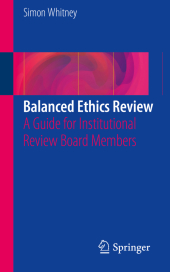 Neuerscheinungen 2015Stand: 2020-02-01 |
Schnellsuche
ISBN/Stichwort/Autor
|
Herderstraße 10
10625 Berlin
Tel.: 030 315 714 16
Fax 030 315 714 14
info@buchspektrum.de |

Simon N. Whitney
Balanced Ethics Review
A Guide for Institutional Review Board Members
1st ed. 2015. 2015. xvii, 131 S. 203 mm
Verlag/Jahr: SPRINGER, BERLIN; SPRINGER INTERNATIONAL PUBLISHING 2015
ISBN: 3-319-20704-0 (3319207040)
Neue ISBN: 978-3-319-20704-9 (9783319207049)
Preis und Lieferzeit: Bitte klicken
This manual will help Institutional Review Boards (IRBs) conduct ethics review that balances the major moral considerations in research with human subjects. Current challenges in the IRB environment are addressed with arguments and insights from dozens of scholars. Useful to the IRB member at any level of experience, Balanced Ethics Review provides the necessary tools needed to create a systemic blueprint for promoting the research and dissemination of scientists and scholars within the standard norms of regulation.
Table of Contents
Title Page
Dedication
Preface
Acknowledgements
Chapter 1. Introduction
1.1 Overview
1.2 Ethics and the IRB
1.3 IRB Process
1.4 Evaluating Biomedical Research
1.5 Consent in Biomedical Research
1.6 The Social Sciences
1.7 Biomedical Research Topics
1.8 FDA and OHRP
1.9 The Future
Chapter 2. Ethics and the IRB
2.1 Your Influential Position
2.2 Evidence
2.3 Scandal
2.4 Research Ethics
2.4.1 Two Ethical Principles
2.4.2 Two Ethical Goals
2.4.3 Goals into Practice
2.4.4 Todayīs Loss of Balance
2.4.5 Itīs Always about People
2.5 Ethical Goals and Regulatory Means
2.5.1 Principles of Regulation
2.5.2 Organization and Legal Framework
2.6 Your IRB Service
2.6.1 Compensation
2.6.2 Protection from Lawsuits
2.6.3 The Community Member
2.7 The Triumph of Ethics Review
Chapter 3. IRB Process
3.1 Principles
3.1.1 Respectfulness
3.1.2 Transparency
3.1.3 Efficiency
3.1.4 Clarity
3.1.5 Accountability
3.1.6 Judiciousness
3.1.7 Rationality
3.1.8 Restraint
3.2 The Curse of Power
3.2.1 Scope of IR
B Authority
3.2.2 Litigation Prevention
3.2.3 Beyond the Regulations
Chapter 4. Evaluating Biomedical Research
4.1 The Objective IRB
4.1.1 Ramsey and the Scientistīs Bias
4.1.2 Your Reasonable Understanding
4.2 Literature Reviews
4.2.1 Death at Johns Hopkins
4.2.2 Reviews by Investigators
4.2.3 Reviews by IRBs
4.3 Ethics and Science
4.3.1 Scientific Modifications
4.3.2 The Value of Research
4.3.3 Risk
4.4 Weighing Risks, Benefits, and Knowledge
4.4.1 Why You Should Protect Subjects
4.4.2 Why You Should Let Subjects Choose
4.4.3 The Conundrum
4.5 Approval Based on Risk and Benefit
4.5.1 Established Theories
4.5.2 Rajczi and Meyer: Let the Subjects Decide
4.6 Consent before Approval
Chapter 5. Consent in Biomedical Research
5.1 Consentīs Goals
5.2 Multisite Consent Forms
5.3 Presenting Risk and Benefit
5.4 Subject Understanding
5.4.1 Less is More
5.4.2 Ethical Considerations
5.5 Supervising Consent Form Writing
5.5.1 Helping the Investigator
5.5.2 Readability
5.5.3 Format
5.6 Editing the Consent Form
Chapter 6. The Social Sciences
6.1 The Value of Dissent
6.2 The Social Impact of R
esearch
6.3 Freedom of Speech
6.4 Psychology
6.4.1 Deception
6.4.2 Threats to Self-Esteem
6.5 Surveys and Interviews
6.5.1 Risk and Benefit
6.5.2 Modifications
6.6 Field Research
6.6.1 Risk
6.6.2 The Sociologistsī Dispute
6.7 Racial Discrimination
Chapter 7. Biomedical Research Topics
7.1 Archival Research
7.1.1 Cancer of the Vagina
7.1.2 Regulatory Oversight
7.1.3 Ethical Considerations
7.1.4 The Common Rule
7.1.5 HIPAA
7.2 The Learning Health Care System
7.2.1 Integrating Research and Clinical Care
7.2.2 Ethical Considerations
7.2.3 Your IRBīs Role
7.3 Randomized Controlled Trials
7.3.1 Risks Inside and Outside of a Trial
7.3.2 Nonphysical Risks
7.4 Comparative Effectiveness Trials
7.4.1 Identifying the Better Treatment
7.4.2 Fadenīs Bold Ethical Proposal
7.4.3 Waiver of Consent in Special Circumstances
7.5 Justice
7.5.1 Unjust Burdens
7.5.2 The Governmental Pursuit of Justice
7.5.3 The Private Pursuit of Justice
7.6 The Vulnerable
7.6.1 Regulatory Overprotection
7.6.2 Fighting Health Disparities
7.7 Paying Subjects
7.7.1 Respecting Subject Choice
7.7.2 Coercion
7.7.3
Setting
a Cap on Wages
7.8 Emergency Research
7.8.1 Criteria for Approval
7.8.2 Ethical Considerations
7.9 Phase 1 Cancer Trials
Chapter 8. FDA and OHRP
8.1 Agencies under Pressure
8.2 Your IRB and the Agencies
8.2.1 Balancing Three Goals
8.2.2 When Regulations Trump Ethics
8.2.3 The Successful IRB
8.2.4 Things Can Go


